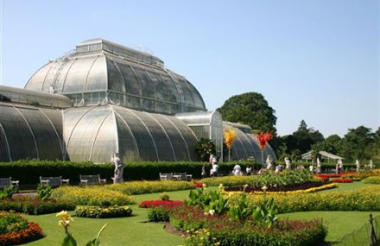Royal Botanic Gardens, Kew has reduced its entry fee for those in receipt of Universal Credit or Pension Credit.
In an effort to become more accessible, Kew has lowered its entry fee to £1 for people on these social security benefits. It requires attendees to bring proof that they are in receipt of Universal Credit or Pension Fund upon entry.
Kew is a public body, supported by the Department for Farming and Rural Affairs and a charity, and as such said it wants to remove barriers for people who may wish to visit.
These fees are applicable in Kew Gardens, London and its sister-location in Wakehurst, Sussex from today.
Without this concession, admission fees for Kew Gardens can be as much as £19.50 for adults during peak times and up to £5 for children. It has also introduced a concession for 16-25 year olds, which ranges from £6.50 - £9 depending on the time of year.
'A place for everyone'
Yesterday, director Richard Deverell announced the concession in a blog post, saying he wants Kew Gardens to be a “place for everyone”.
Cultural activities, like visiting Kew Gardens, can be inaccessible to those on lower incomes. The gardens feel this is a step in the right direction to amending this deficit.
The change has been largely well received on social media. At the time of writing, a post announcing the concession has garnered 425 likes and over 80 retweets.
One Twitter user replied: “Well done, this is fantastic”. While another wrote: “Love, love, LOVE this genuine commitment to removing barriers to access”.
Kew is a place for everyone.
— Kew Gardens (@kewgardens) January 10, 2022
We're working hard to:
🔬 Improve access to Kew’s Science globally
🌿 Make our gardens accessible for everyone
📜 Broaden the stories we tell
🌱 Acknowledge our history
Find out more in our director Richard Deverell’s blog: https://t.co/4FOokFMEzX pic.twitter.com/eyT3dRSFNo
However, other users queried if those on Employment and Support Allowance (ESA) or disability benefits could also qualify for the reduced entry fee. Kew is yet to respond.
Increasing number of visitors from underrepresented groups
Kew also revealed that it aims to increase the number of visitors from underrepresented groups tenfold by 2030. To do this it will produce outreach programmes, create targeted promotions and diversify its events and festivals.
“Kew is in part a product of Empire and colonialism,” Deverell said. He claimed efforts will be made to acknowledge this across the gardens and address the less favourable parts of botanic history - including the history of sugar, which played a key role in British imperialism.
Deverell emphasised that this was not politicising the gardens but re-examining its history through a 21st century lens. He said: “I want to stress what we are not doing: we are emphatically not disrespecting or censoring our history; nor are we apologising; nor are we removing any items from display.”
RBG's new strategy document, Our Manifesto for Change, goes into more detail about the facility's goals for further inclusivity.
Related articles












